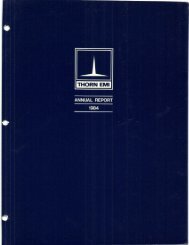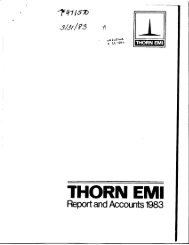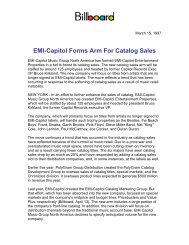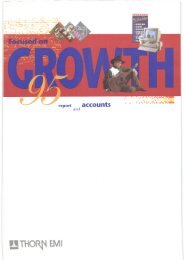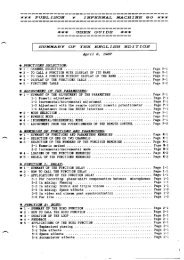Untitled
Untitled
Untitled
You also want an ePaper? Increase the reach of your titles
YUMPU automatically turns print PDFs into web optimized ePapers that Google loves.
Corporate Governance (continued)<br />
To broaden their experience, the Executive Directo6 are<br />
errouragd to tnke external appointrnenb as non€xecutive<br />
dirrtors, usually up to a maxmum of t\ o. They may retain<br />
the remuneration from such appointments. All appotntmenb<br />
must be appored by the Board to aloid conflicts of inter6l<br />
Board committees<br />
The committees established by the Board and their membeEhip<br />
are set out on page 24. Each committee has witten terms of<br />
reference and levels of authority and, except in the case of the<br />
Remuneration Committee, minutes of meetings are circulated<br />
to all Directo6.<br />
The principal committees are the Audrt, Remuneration,<br />
l"lomination and Executi\,e Committees. Reflecting the important<br />
role played by the independent Non€,\ecutrve Directon in<br />
ensuring high standards of corporate gcrrernance, the Audit<br />
and Remuneration Committees comprise all the Non€,\ecutive<br />
Directo6. Follc fiing the retrrement of Sir Peter Watters, the Audit<br />
Committee has been chaired by Kahben O'Doncnran, wfiilst<br />
the Remuneration Committee has been chaired by Sir Dominic<br />
Cadbury the senior independent Non+xeolti\€ Dircctor. The<br />
Nomination Committee comprises the Chairman, in addition to<br />
all the Non+xecutive Directo6, and is also chaired by the senior<br />
Nonexecuttve Director. The Executive Committee comprises the<br />
Chairman, the Group Finance Dircctor and the Chief Executive<br />
fficers of the Companyt two main busines units.<br />
The role of the Remuneration Committee is described on<br />
page 30. tt rneets at least three times each year. The nnin<br />
responsibilities and procedures of the other three principal<br />
Committees are a follovrr:<br />
Audit Conmitte - makes recommendations to the Board<br />
regarding the appointment of the o\ternal auditors, and rans,tus<br />
their independence and obJecttvity. lhe Committee Igr'iqrs the<br />
half-year and annual financial statemen6 with particular €ference<br />
to accounting policies and practices, and the scope and results<br />
of the audit. lt also reviq 6 the nsk assesment and audit plan of<br />
the internal audit department and other control procedures. The<br />
Committee mees three times each year, and iB meetings are<br />
normally attended by the Group Finance Directot the enernal<br />
audito6, the Group Financial Controller and the Head of lnternal<br />
Audit. At least once eadr )€ar the Committee meets with the<br />
e,rternal auditon wi'i*rout the presence of Executive Dircctors or<br />
other management.<br />
N@iinatbn Committ@ - makes recommendations to the Board<br />
on the appointment of Directors and senior executilres and the<br />
reappointment of Non€xe€utrve Directols on the expiry of their<br />
threeyear term of appointment. Ihe Committee meets when<br />
required.<br />
Exer't/tive Cqnmitte - mponsible for the approval of acquisitions,<br />
divestments, capital expenditure and contractual commitrnents<br />
belcn/t/ the leuel vvhich the Board has reserved to rtsetf for deasion,<br />
and for certain operational, administratile and other routine<br />
matters. The Committee also regularly rwie!,\6 and reporb to<br />
the Board on the performance of the Groups businesses. Ihe<br />
Committee meeb at le6t six times each year<br />
Directon' remuneration<br />
lnformation about the Companyb remuneratton policy and<br />
procedures and about the Directo6' remuneration is grven in<br />
the Remuneration Report on pages 30 to 36.<br />
Directors responsibilities<br />
UK company law requires th€ Directors to prepare financial<br />
statemenb for each linancial year which grve a true and fair vis /<br />
oJ the state of affaiE of the Cbmpany an-d of the Group and of<br />
the profh or loss of the Group for that period. ln preparing those<br />
financial statemenE, the Dirccto6 are required to select suhable<br />
accounting policies and then appt them consistently, to make<br />
.iudgements and estimates that are reasonable and prudent<br />
and to state whether applicable accountrng standarcls ha\€ been<br />
followed, subject to any material departures disclosed and<br />
explained in the financial statemenb. The DiEctors confirm that<br />
they have complied with these requiremenb in preparing the<br />
financial statements on pages 38 to 69.<br />
The Directors are responsible for keeping poper accounting<br />
recor* wtrich disdose, with reasonable accuracy at any time, the<br />
financial positron of the Group and enable them to ensure that<br />
the financial statemen$ comply wrth the Companies Act 1985.<br />
They are also responsible for safeguarding th€ assets of the Group<br />
and hence for taking reasonable steps for the praention and<br />
detection of fraud and other inegularities.<br />
Going concern<br />
The Directors belieue, after maktng inquiries that they consider<br />
to be appropriate, that the Group has adequate resources to<br />
continue in operational existence for the foreseeable future. For<br />
this reason, they continue to adopt the going concern basis in<br />
preparing the financial statements.<br />
lntemal control<br />
Ihe Combined Code requires the Board to maintain a sound<br />
q6tem oJ internal control, to revierrv rts effectircness, and to report<br />
to shareholdeE that it has done so. This extends the prwious<br />
requirement ccn€ring internal finarKial controls to those contol<br />
policies and procedures relating to significant business, operational,<br />
compliance and other rsls. Guidance on this section of the<br />
Combined Code was published in September 1999 in /ntemal<br />
Control: Guidance for Dr






